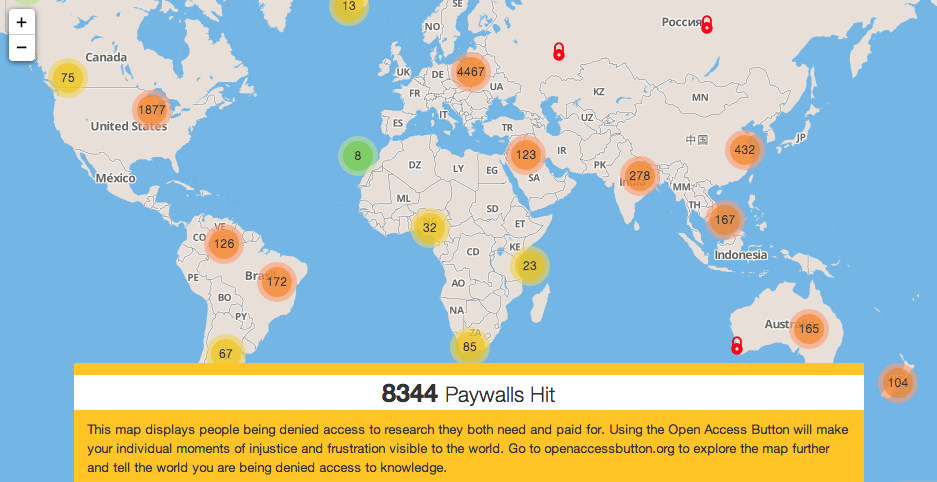Ever felt frustrated by not being able to access a piece of research? In this guest post, Chealsye Bowley, Launch Coordinator for Open Access Button tells us how the Button could help and the work they’ve got in store to make it even more effective.
In November 2013 we launched the Open Access Button. The Button is a browser bookmarklet that allows users to report when they hit a paywall and are denied access to research. Being denied access to research is often an invisible problem and through the Button we aim to make the problem visible, collect the individual experiences, and showcase the global magnitude of the problem.
We’ve tracked and mapped over 8,300 paywalls since the launch. These paywalls represent 8,300 times that scholars were denied access to research in their field – students couldn’t access additional sources for their thesis, or doctors couldn’t read the latest medical research. The stories collected so far are just the tip of a large iceberg of those being denied access to research.
The Button that was released in November was always intended to be the beta version, so over the last eight months we’ve been expanding the team and building up to the development of a better Open Access Button. We’ve grown our international student team to twenty members and brought on a professional steering committee. Probably the most important addition is the Community and Advocacy Team, which will be instrumental in increasing the use of the Button globally and advocating for open access.
Every new user and reported paywall makes the Button a success, but we have been fortunate to receive formal recognition as well. The Button received the Rex Crossley Award for the Best Project from the International Federation of Medical Students’ Associations (IFMSA) in March, and in June we were awarded £5,000 from the Jisc Summer of Student Innovation to develop an Open Access Button mobile app.
In April we launched an IndieGoGo crowdfunding campaign to raise £20,000 to support the development of the Open Access Button. We knew crowdfunding would be an experiment and we met 10% of our goal. We ultimately raised £2,135, and our funding team is hard at work applying for grants and other sources of revenue.
The next phase of Button development began in the spring and it will be launched toward the end of the year. Some of our plans and features for the Button are the following:
- Rebuilding the Button as a browser plug-in. This will allow us to radically increase what can be done and provide a scalable platform for the future.
- A system where users can request access to a paper from a paper’s correspondence address and in response the author can submit the link to an openly available version to us. We’ll then send all other requests to that link.
- We’re also exploring allowing repositories to submit information on the papers they contain into a database, which we can use to link research published in journals behind paywalls to repositories.
- We’re expanding our use of social media to display altmetrics and make using Button 2.0 the easiest way to share research you care about.
- We’re looking to build great API’s (how computers speak to other computers) to allow anyone to use our data, and features of the project they find useful. A notable project in this area is the plan to signal if a reference is open access or not on Wikipedia.
You can learn about additional features and ideas for the Button in our features update blog post written during the crowdfunding campaign.
As we continue to develop the Open Access Button, we are going to continue collecting data and user stories in order to advocate for open access. If you’re hitting paywalls, don’t be silent, download the Button at openaccessbutton.org and report them. To stay up to date on the progress of Button, you can follow us on Twitter, like us on Facebook, or read our blog.
Chealsye Bowley is the Launch Coordinator for the Open Access Button. She is currently a solo librarian at the Florida State University Study Center in Florence, Italy, and in September will begin her MSc in Science, Technology, and Society at University College London.

Comments